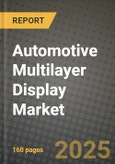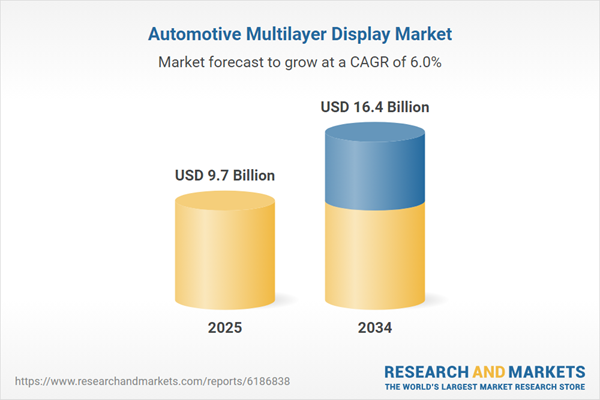The automotive multilayer display market is revolutionizing in-car human-machine interfaces (HMIs) by offering layered visual elements that enhance clarity, depth perception, and usability. Multilayer displays use transparent screens stacked over one another to present multiple information layers, enabling drivers and passengers to view navigation, entertainment, and safety data simultaneously without overlapping or clutter. This technology improves readability, reduces distractions, and provides a more sophisticated visual experience compared to traditional single-layer displays.
As consumer expectations for advanced infotainment systems and driver-assist features grow, automakers are increasingly incorporating multilayer displays into dashboards, center consoles, and instrument clusters. These displays are becoming integral to vehicles with advanced driver assistance systems (ADAS) and connected services, helping drivers quickly identify critical information while maintaining focus on the road. In addition, advancements in display resolution, touch sensitivity, and augmented reality integration have further enhanced the functionality and appeal of multilayer displays.
However, the automotive multilayer display market faces challenges such as higher production costs, the complexity of integrating layered screens with existing vehicle electronics, and the need to comply with stringent automotive standards. Nonetheless, the growing demand for sophisticated vehicle HMIs, combined with ongoing innovation in display technology, is expected to drive the market’s growth and adoption in the coming years.
Key Insights: Automotive Multilayer Display Market
One of theThe growing adoption of advanced driver assistance systems (ADAS) and connected car technologies is a major driver of the automotive multilayer display market. Multilayer displays allow automakers to present complex data in an intuitive and easily digestible manner, improving the user experience and making it easier for drivers to interpret critical information while driving.
Another driver is the increasing focus on in-car comfort and user experience. As consumers demand more intuitive, visually appealing interfaces, multilayer displays provide a unique way to differentiate vehicle interiors. This emphasis on premium interiors and seamless HMIs is pushing automakers to adopt innovative display solutions, further fueling market growth.
One challenge in the automotive multilayer display market is the high cost of production and integration. Multilayer displays require advanced manufacturing processes and materials, which can drive up production costs. Ensuring that these displays are cost-effective enough for mass-market vehicles is a key hurdle for manufacturers.
Another challenge is the complexity of integrating multilayer displays into existing vehicle systems. Ensuring compatibility with existing electronics, maintaining reliability under automotive conditions, and achieving compliance with industry standards all add to development time and costs. Overcoming these challenges requires close collaboration between automakers, display manufacturers, and software developers.
Automotive Multilayer Display Market Segmentation
By Type
- Analog Display
- Digital Display
By Vehicle Type
- Light Commercial Vehicle
- Heavy Commercial Vehicle
- Passenger Car
By Application
- Fuel Indicator
- Speed Indicator
- Acceleration Indicator
Key Companies Analysed
- Mitsubishi Motors Corporation
- Bayerische Motoren Werke AG
- Robert Bosch GmbH
- Audi AG
- Renault SA
- Continental AG
- Panasonic Corporation
- Hyundai Mobis
- Johnson Controls
- Pioneer Corporation
- Skoda Auto
- Nippon Seiki Co. Ltd.
- LG Display Co. Ltd
- Aptiv Plc
- KYOCERA Corporation
- AU Optronics Corp.
- HARMAN International
- Varitronix
- Yazaki Corporation
- Visteon Corporation
- Socionext America Inc.
- Alpine Electronics Inc
- Denso Corporation
- SmartKem Ltd.
- PureDepth Inc.
Automotive Multilayer Display Market Analytics
The report employs rigorous tools, including Porter’s Five Forces, value chain mapping, and scenario-based modeling, to assess supply-demand dynamics. Cross-sector influences from parent, derived, and substitute markets are evaluated to identify risks and opportunities. Trade and pricing analytics provide an up-to-date view of international flows, including leading exporters, importers, and regional price trends.Macroeconomic indicators, policy frameworks such as carbon pricing and energy security strategies, and evolving consumer behavior are considered in forecasting scenarios. Recent deal flows, partnerships, and technology innovations are incorporated to assess their impact on future market performance.
Automotive Multilayer Display Market Competitive Intelligence
The competitive landscape is mapped through proprietary frameworks, profiling leading companies with details on business models, product portfolios, financial performance, and strategic initiatives. Key developments such as mergers & acquisitions, technology collaborations, investment inflows, and regional expansions are analyzed for their competitive impact. The report also identifies emerging players and innovative startups contributing to market disruption.Regional insights highlight the most promising investment destinations, regulatory landscapes, and evolving partnerships across energy and industrial corridors.
Countries Covered
- North America - Automotive Multilayer Display market data and outlook to 2034
- United States
- Canada
- Mexico
- Europe - Automotive Multilayer Display market data and outlook to 2034
- Germany
- United Kingdom
- France
- Italy
- Spain
- BeNeLux
- Russia
- Sweden
- Asia-Pacific - Automotive Multilayer Display market data and outlook to 2034
- China
- Japan
- India
- South Korea
- Australia
- Indonesia
- Malaysia
- Vietnam
- Middle East and Africa - Automotive Multilayer Display market data and outlook to 2034
- Saudi Arabia
- South Africa
- Iran
- UAE
- Egypt
- South and Central America - Automotive Multilayer Display market data and outlook to 2034
- Brazil
- Argentina
- Chile
- Peru
Research Methodology
This study combines primary inputs from industry experts across the Automotive Multilayer Display value chain with secondary data from associations, government publications, trade databases, and company disclosures. Proprietary modeling techniques, including data triangulation, statistical correlation, and scenario planning, are applied to deliver reliable market sizing and forecasting.Key Questions Addressed
- What is the current and forecast market size of the Automotive Multilayer Display industry at global, regional, and country levels?
- Which types, applications, and technologies present the highest growth potential?
- How are supply chains adapting to geopolitical and economic shocks?
- What role do policy frameworks, trade flows, and sustainability targets play in shaping demand?
- Who are the leading players, and how are their strategies evolving in the face of global uncertainty?
- Which regional “hotspots” and customer segments will outpace the market, and what go-to-market and partnership models best support entry and expansion?
- Where are the most investable opportunities - across technology roadmaps, sustainability-linked innovation, and M&A - and what is the best segment to invest over the next 3-5 years?
Your Key Takeaways from the Automotive Multilayer Display Market Report
- Global Automotive Multilayer Display market size and growth projections (CAGR), 2024-2034
- Impact of Russia-Ukraine, Israel-Palestine, and Hamas conflicts on Automotive Multilayer Display trade, costs, and supply chains
- Automotive Multilayer Display market size, share, and outlook across 5 regions and 27 countries, 2023-2034
- Automotive Multilayer Display market size, CAGR, and market share of key products, applications, and end-user verticals, 2023-2034
- Short- and long-term Automotive Multilayer Display market trends, drivers, restraints, and opportunities
- Porter’s Five Forces analysis, technological developments, and Automotive Multilayer Display supply chain analysis
- Automotive Multilayer Display trade analysis, Automotive Multilayer Display market price analysis, and Automotive Multilayer Display supply/demand dynamics
- Profiles of 5 leading companies - overview, key strategies, financials, and products
- Latest Automotive Multilayer Display market news and developments
Additional Support
With the purchase of this report, you will receive:- An updated PDF report and an MS Excel data workbook containing all market tables and figures for easy analysis.
- 7-day post-sale analyst support for clarifications and in-scope supplementary data, ensuring the deliverable aligns precisely with your requirements.
- Complimentary report update to incorporate the latest available data and the impact of recent market developments.
This product will be delivered within 1-3 business days.
Table of Contents
Companies Mentioned
- Mitsubishi Motors Corporation
- Bayerische Motoren Werke AG
- Robert Bosch GmbH
- Audi AG
- Renault SA
- Continental AG
- Panasonic Corporation
- Hyundai Mobis
- Johnson Controls
- Pioneer Corporation
- Skoda Auto
- Nippon Seiki Co. Ltd.
- LG Display Co. Ltd.
- Aptiv PLC
- KYOCERA Corporation
- AU Optronics Corp.
- HARMAN International
- Varitronix
- Yazaki Corporation
- Visteon Corporation
- Socionext America Inc.
- Alpine Electronics Inc.
- Denso Corporation
- SmartKem Ltd.
- PureDepth Inc.
Table Information
| Report Attribute | Details |
|---|---|
| No. of Pages | 160 |
| Published | October 2025 |
| Forecast Period | 2025 - 2034 |
| Estimated Market Value ( USD | $ 9.7 Billion |
| Forecasted Market Value ( USD | $ 16.4 Billion |
| Compound Annual Growth Rate | 6.0% |
| Regions Covered | Global |
| No. of Companies Mentioned | 25 |









